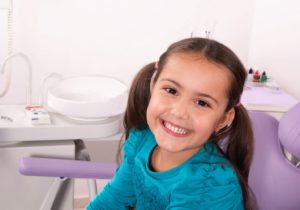Will My Child Benefit from Orofacial Myology Therapy?
February 2, 2023

When it comes to children’s oral health, things such as cavities, gum disease, and tooth loss are just a few issues that are worth preventing and addressing if they occur. That said, one aspect of oral health that is often overlooked is the functionality of orofacial structures, such as the tongue and lips. These parts of the mouth are just as important as the teeth and gums, and if they become compromised, serious problems might unfold. Fortunately, orofacial myology therapy can usually help! Here’s more about what this treatment entails and when it’s typically a good option for your child.
What Is Orofacial Myology Therapy?
Orofacial myology therapy, also referred to as OMT, is essentially physical therapy for the mouth! It employs exercises that can help your child breathe better, chew more easily, speak more clearly, and experience several other benefits that’ll positively impact their smile and quality of life. Over the course of several appointments, the therapist will work with your child to help them learn to properly use their oral structures.
Two of the most common problems that result in the need for OMT are lip tie and tongue tie. Lip tie occurs when the upper lip is connected to the upper gums, whereas tongue tie refers to when extra tissue on the bottom of the tongue restricts its movement. Needless to say, both of these conditions can make it difficult for an infant to correctly breastfeed or bottle feed, and it might also lead to concerns that can impact long-term oral health including mouth-breathing, obstructive sleep apnea, and more.
Signs Your Child Might Benefit From OMT
Some obvious indicators that your child may benefit from orofacial myology therapy include:
- They continually breathe through their mouth.
- They produce speech sounds with the tongue too far forward in the mouth.
- They’ve been in speech therapy but still have trouble articulating certain sounds.
- Their dentist or orthodontist has brought up tongue thrust or another orofacial myofunctional disorder.
- They snore loudly or exhibit other signs of OSA (obstructive sleep apnea).
Orofacial myology therapy can play a pivotal role in your child’s development and set them up for a lifetime of happy and healthy smiling. If your child exhibits any of the previously listed signs, you shouldn’t hesitate to speak with an expert who can recommend a treatment plan.
About the Author
Dr. N. Garcia-DeMartino received her DMD from Fairleigh Dickinson University and has proudly served the dental needs of patients and families in the Phillipsburg, NJ community for several years. She’s a member of several notable professional organizations including the American Dental Association and the Academy of Children’s Dentistry. If you have any questions about orofacial myology therapy or need to schedule a visit for your little one, don’t hesitate to contact her practice online or by phone for further assistance: (908) 859-5260.
No Comments
No comments yet.
RSS feed for comments on this post.
Sorry, the comment form is closed at this time.
